The Subaru Outback is as Australian in origin as its name suggests. The model as we know it today finds its roots in the Legacy Wagon (named Liberty in Australia), which evolved in other global regions into the Legacy Outback.
When the model arrived in Australia in 1996, however, the Legacy part was dropped leaving just Outback and the naming tradition continued into almost all other subsequent global introductions.
It is not to be confused with the Outback Sport that was a wagon version of the Impreza first offered in the US in the 1990s.
Now in its sixth generation, the Outback has adopted Subaru’s Global Platform (SGP) and, like its closely related Forester sibling, is popular among drivers that want a good balance of on-road manners as well as respectable off-road ability.
The latest Subaru Outback, still more of a high-riding wagon than conventional SUV, was introduced to Australia in 2021 exclusively as a 2.5-litre non-turbo flat-four petrol coupled to a continuously variable transmission (CVT) and the company’s proprietary all-wheel-drive system.
It was joined in 2022 by two high-performance XT variants, which borrowed the 2.4-litre turbo engine from the WRX.
While any five-seater SUV could be listed as a rival, about the only true direct rival in concept to the Subaru Outback is Volvo’s V60 Cross Country wagon.
Latest Review
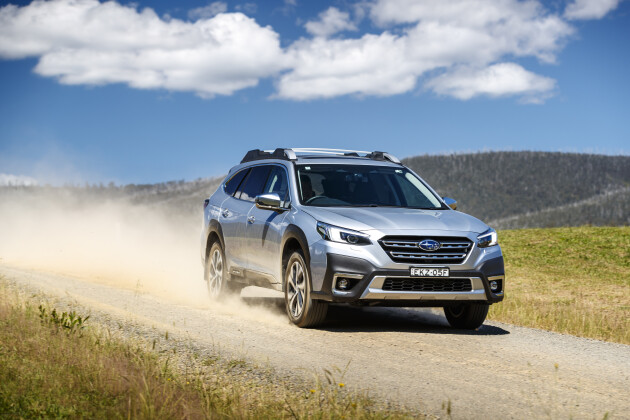
Living with the 2021 Subaru Outback Touring
Subie’s mainstay crossover arrives to conquer both ’burbs and bush
UPDATE, September 2022: Refreshed MY23 range and new turbo models
The updated 2023 Subaru Outback is now on sale in Australia, debuting a turbocharged XT model and a number of key infotainment upgrades.
Get the full story at the link below.
Original story continues
2021 Subaru Outback Touring long-term review
- Welcome: Outback hits town
- Part two: Starlink Gazer
- Part three: Subie Lovin'
- Part four: Reporting for duty
- Part five: Sweet sorrow
Welcome: Outback hits town
Price as tested: $47,790
This month: 461km @ 10.1L/100km
Overall: 461km @ 10.1L/100km
"Geez, it’s low!” says the Scientist, jumping into the 2021 Subaru Outback for the first time. We’ve done a fair few miles in Everests, MU-Xs and the like of late, so she’s pleasantly surprised entry doesn’t require the expected grab of the Jesus handle.
I imagine her reaction would please the brains trust at Subaru, as it means the new-for-2021 Outback is scanning as an SUV, rather than the high-riding, crossover wagon it actually is. SUV sales are hot and Subaru needs to maintain or grow its slice of that lucrative pie.
Subaru would also be happy that the Scientist and I are smack in the middle of the ‘Ideal Outback intenders’ Venn diagram. To wit, we are current Subaru owners, we prefer wagons to SUVs and we lead an ‘active outdoor lifestyle’.
Our daily drive is an older Forester, which has been a faithful companion both in the city and on camping trips away. It is, however, a little on the small side for truly comfortable long-distance touring. And the back seat is now unable to comfortably accommodate the limbs of our fast-growing nephews.
The new-for-2021 Outback – especially in top-spec Touring form here – therefore represents an exciting step up.
While the sixth-generation Outback looks outwardly familiar, it has copped a serious birthday under the skin. It’s on a new platform, has an increased towing capacity to 2000kg braked, an expanded suite of Subaru’s EyeSight driver assistance tech and handy improvements to the interior dimensions.
The diesel and six-cylinder engines are gone, leaving only a heavily revised, 138kW 2.5-litre direct injection flat four and automatic continuously variable transmission (CVT) as the only driveline combo on offer.
The range has also been rationalised down to three variants – the base Outback AWD for $39,990 before on road costs, the Sport for $44,490 and the Touring for $47,790.
All Outbacks run a Tesla-aping, vertical 11.6-inch touchscreen, with Apple CarPlay and Android Auto (both need to be plugged in), paddleshifters, dual-zone climate control, self-levelling LED headlights and digital radio. Seventeen-inch alloys are standard, with a different design for each trim level.
All Outbacks run a Tesla-aping, vertical 11.6-inch touchscreen, with both Apple CarPlay and Android Auto.
The Sport looks to be a good deal, adding heated seats for everyone bar the middle of the back row, but also a hands-free powered tailgate, sports pedals, water-repellent trim, sat-nav and front/side view cameras.
In terms of features exclusive to the Touring, the vegan Scientist cares not for the leather-accented trim but loves the clarity of the nine-speaker Harman Kardon stereo. We agree ventilated seats would be more useful in Aussie summers than the sunroof. The Touring also gets a heated tiller and an auto-dipping passenger-side exterior mirror, both of which we could do without.
Our first week or so with the Outback was a purely urban affair, including trips to the Lunar Drive-In and to the hellscape that is the Richmond Ikea car park. The latter gave the front and side view monitors a solid workout, but the addition of ultrasonic sensors and a bird’s eye view camera would be welcome in such a hostile environment.
That aside, our first impressions are that the Outback is comfy to sit in, has excellent vision and handles bumps, potholes and suburban traffic with calming aplomb.
The CVT with its eight faux gears is a slick match for the four-pot. And while the Outback is no rocketship, manually shifting helps the fun quotient. You may feel differently – I’m nothing if not easily amused.
Inside, the various features are fairly intuitive to nut out, with extra points given for manual volume and temperature controls. At the lights, the start/stop function is so unobtrusive that we barely notice it.
The Scientist couldn’t resist immediately trialling the adaptive cruise control with its semi-autonomous lane assist. She found that while the radar cruise control has so far done an admirable job, she did not make friends with the self-steering. “It won’t stay in the middle of the lane,” she reports. “It wants to put me right on top of the left-hand lane markings. The BMW did it much better.”
The BMW she refers to is a 750Li that has permanently raised her expectations of all new vehicles to preposterously high levels. However, I agree with her that the Subie’s self-steering isn’t worth the effort on Melbourne’s ring roads – perhaps it will fare better when we head up the Hume for Christmas.
Part two: Starlink Gazer
This month: 431km @ 10.1L/100km
Overall: 692km @ 10.1L/100km
Guest author: Sebastian Quirit
See this here [slaps bonnet], that’s $50K worth of Japanese ingenuity,” I say as I try to convince my family to bat a collective eyelid at my loan chariot. My wife, unimpressed the Outback didn’t park itself, says, “Is this what you’d buy if I gave you $50K to spend?” I pause to contemplate the question. Does the Subaru really tickle my fancy, or should I try to ram my kids in the back of a Toyota GR86?
I won’t bore you by listing the three spec levels the Outback comes in, or the fact that under the identity-confused ‘Wag-UV’, is the same platform used by the XV, Forester and Impreza. But what I will tell you is that being a father of three kids does require a certain type of car, and the Outback does fit a round peg into the round hole.
The Outback continues the ‘cross-country’ look with plastic faux flares and bumper trims that scream US-market. With that trim running the length of the car and into the lower door section, the sill panels taper inward, allowing entry into the cabin without transferring mud to your pant legs. A master stroke by the Subaru design team which can only be truly appreciated if you’ve ever soiled your formal slacks on the sill panel of a car.
But what happened with the roof racks? The trim sure looks great, but you won’t be able to say “that’s not going anywhere” if you can’t physically fit a ratchet strap around the roof rack due to the encroaching plastics. Completing the walk around, the Outback is crammed with all the things expected from a car built this side of the moon landing.
At the front, the daytime running lights double as indicators, auto LED headlights self-level, sense dusk and respond to steering inputs. At the rear, the LED tail-lights ensure you will never have to yell at your kid to “hold the torch still” whilst changing a blown globe.
Inside this Touring variant, Nappa leather seats resist poorly sealed Maccas cup spills and invite you into a deceptively spacious interior. Coming from a Toyota Kluger family bus, I was sure I was going to have to drive with my knees in the steering wheel, but the Outback passed with flying colours. I didn’t feel a single kick in the backrest from my giraffe-legged children.
Not to be confused with the satellite constellation, Subaru’s Starlink infotainment system is a blessing and a curse. The 11.6-inch screen unlocks control of all vehicle sub-systems with a slick-looking but cumbersome user interface. This is a common theme with Starlink. The intention is there but execution falls short, as does the in-built sat-nav by TomTom. If you’re a Google Maps user, skip straight to (wired) Apple Carplay or Android Auto. The GPS navigation is astonishingly primitive compared to the likes of Google.
On road the EyeSight Driver Assist System consists of two stereoscopic roof-mounted cameras serving as the car’s eyes. Subaru has nailed the EyeSight suite with a slew of collision-avoidance safeguards. Having all driver assists active makes the Outback a dream to drive once you understand what the limitations and intended uses are.
The adaptive cruise control is by far the most advanced system I’ve used. Set the desired speed and distance to the car in front and watch as EyeSight takes care of all throttle and braking inputs, from full highway speed down to a complete stop and back again. Add to that semi-autonomous steering and you have a system that has a marked effect on driver fatigue in stop/start traffic.
However, it does have its limitations, which can make for some bum-puckering moments. The system relies on road line markings to determine the car’s position. Try to engage self-steering in a lane that’s too wide and you’ll find yourself wandering from left to right perilously close to the lane markings, much closer than you or I would deem comfortable.
The semi-autonomous system was not designed to take away human decision making. Realising these features are designed to assist, rather than replace the driver, helps you frame your expectations.
True to Subaru’s WRC heritage, the Outback is still a satisfying car to hustle, even with three miniature Colin McRaes in the back seat. Whether navigating the dirt carpark of my local footy club, or taking the long route down a favourite road, I’m not left wanting anything more after a week of urban adventures. So with $50K in hand would I buy the Outback? Actually, I probably would...
-SQ
Part three: Subie lovin'
- This month: 551km @ 8.3L/100km
- Overall: 1443km @ 9.4L/100km
Last month, the Scientist and I handed our top-spec Outback Touring to our mate Sebastian Quirit, as we were keen to see what the owner of three actual children (as opposed to the furry kind) would make of Subaru’s big wagon.
Seb was impressed with both the Outback’s ability to comfortably accommodate his brood, as well as the efficacy of the car’s EyeSight driver assistance tech. And as an avid club racer, he was also pleased to find the Outback is as entertaining in the twisty bits as one might hope a mass-market family car to be.
While I regained custody of the Outback for Christmas, Omicron nixed our planned jaunt up the Hume and we instead settled for a couple of weekend missions around regional Victoria. The relaxed pace gave us the time and headspace needed to get better acquainted with some of the car’s tech features – something we hadn’t got to while using it as a commuter.
Having recently received some unpleasant news in the mail from Victoria Police in the form of various infringement notices, the Scientist gently suggested I first suss out the speed-sign recognition and intelligent speed limiter systems.
The warning system is handy and gets the speed signs right most of the time, though I’d appreciate the option of an audible speed warning. Hell, I’d take a mild electric shock at this point.
The intelligent limiter is a neat alternative to cruise control when you’re in an area with regularly changing speed limits. You need to keep your foot on the gas to maintain forward progress, but the car will not respond to increased pressure on the go pedal once you reach the signed limit. Although if you really do need to get going in a hurry, flooring it will reset the system.
And sure enough, the car will bring you back from say 80km/h to 60km/h as the signs change. As with the visual warning, the system doesn’t always clock the right limit (and still slows you down for 40km/h school zones in the middle of the night), but reassuringly, it errs on the conservative side, speed-wise.
The limiter isn’t a cure for inattention or idiocy − rather, to make the system work its best, one needs to drive smoothly and pay attention. For anyone with the Sword of Damoclese hanging over their licence, it’s a handy tool. Think of it as the gamification of trying to keep your points.
The same applies to the semi autonomous steering function. Around town, we’d found it a frustrating feature, which saw us fighting the car’s inputs and then turning it off. Out on the open road, I had a moment of Zen-like clarity and realised I needed to back off and let the car do its thing.
Driver inputs are still required − both to reassure the car that you still have your hands on the wheel and to make adjustments where necessary − but overall, the function is extremely easy to use.
The self-centering isn’t perfect though and tends to hug one side of the lane or the other. For us, the jury is still out on the usefulness of the feature, though you may find it helpful in reducing fatigue.
Our next task was to personalise a few key settings to suit our tastes.
For example, we found the Google Maps directions were a loud, painful interruption to our podcast consumption. After some suffering, the Scientist clicked through a couple of menus to discover that she could adjust it – and it stayed that way, too.
Same goes for the cruise control acceleration characteristics feature, which offers five levels between ‘eco’ at one end and ‘dynamic’ at the other. The ‘dynamic’ setting was great for dual carriageways, providing strong acceleration when we pulled out to overtake, while ‘eco’ was the setting of choice when traversing less-predictable B-roads.
The exception to the set-and-forget rule is the stop/start function – if you’re not a fan, you’ll need to turn it off each time you jump in the car.
Finally, setting up individual profiles via the Outback’s Driver Monitoring System was well worth it. Not only does it apply each driver’s personal seat, mirror and air-con preferences, but it also recognises which registered driver is behind the wheel and automatically pairs with the correct phone.
The moral of the story is, while neither the Scientist or I are big on reading instructions – we both like to figure things out on the fly – taking some time to get to know the Outback yielded some useful results and made us enjoy an already-impressive vehicle all the more. Fingers crossed we can get away for a longer trip, further off the beaten track next month.
Part four: Reporting for duty
- This month: 1243km @ 8.1L/100km
- Overall: 1945km @ 9.1L/100km
Last month, I signed off hoping that I’d get the chance to take the Outback further off the beaten track and boy, I wasn’t disappointed!
You see, the next issue is the Wheels Car of the Year edition. This year, the team headed down to the Australian Automotive Research Centre, located near Anglesea on Victoria’s Surf Coast. The AARC is a phenomenal venue, set in a spectacular setting.
It is a fair hike from Melbourne, though, and with 20 cars, six judges and a stack of content to be made, COTY is quite the operation, requiring plenty of additional personal and support vehicles. And so, my supremely practical Outback was commandeered by photographer Alastair Brook for the duration.
“I had the choice of a Ford Ranger Raptor and the Outback,” says AB. “They both had the room and dirt-road capability I was after, but for me the Subaru was the pick, because I’d rather do tracking shots out of the back of a wagon than a ute!”
Wise beyond his years, this lad.
With ‘my’ car pressed into COTY service, I stuck my hand up to help out as well and why not? Five days with the latest and greatest vehicles on the Aussie market, pushed to their limits on a stack of different surfaces by some of the best minds in the biz? It’s any inquisitively minded car lover’s dream.
Not that my brief was particularly glamorous. Most of my time at COTY was spent driving cars for transport stages or photography, lugging gear and helping to feed and water the editorial masses.
I also chauffeured Alastair around whenever necessary and spent some time in a silver Outback Touring that was part of the COTY testing.
The real bonus of all this was that I got to put the Outback through its paces on dirt roads. Given that I really enjoy hustling the Subaru on tarmac, doing the same on the gravel was even better. And when I did get the back end out too far, the ESP intervened and corrected me without fuss.
I even got to try a couple of full panic stops on the gravel. You can check out the actual COTY data on this next month, but for mine, on an unsealed surface, the Outback pulled up straight and as quickly as you’d like from a family car.
While this was fun, I’m a mere novice on the rough stuff, so I lobbed the keys to 4x4 Australia Editor Matt Raudonikis for his feedback. Matt took the Outback for a burn on both the AARC’s 9km ‘second-class surface’ and on a twisty ribbon of hotmix, then reported back in.
“I’m surprised, it was better than I expected,” said Matt.
“The dirt road we were on mimics a quintessential Australian outback road and at speed, the Subaru is every bit as composed as something like a Toyota Prado. There’s not a lot of noise and it absorbs bumps better than some of the cars we’ve been testing for 4x4 of the Year.
“And on the twisty sealed section, it feels much more planted than a big 4x4 because it is so much lower to the ground.
“There was a time when people drove Holdens and Fords on outback roads like this every day of the week and I think the Australian family car should be made to do the same. For someone who needs to drive on dirt roads regularly, the Outback could fill that role really well. You might just need to look into finding a more durable tyre.”
High praise, but Matt does long for the character of Subarus of old:
“I think they’ve lost a bit of their character,” he reckons. “The boxer engine noise and the frameless doors were cool!”
And at the end of a long week, a weary photographer Alastair was glad he chose the Outback:
“I liked it. The road in and out of AARC is gravel and I was glad of the soft, compliant suspension. The driving position and visibility were both quite good. I liked the big screen and Apple CarPlay worked really well for me. The car moves around a bit in crosswinds on the highway, but the lane-keep assist helped there.
Any downsides? “I think it needs more power and a bit of attitude,” quoth Brook.
“The CVT works fine, but you want a bit more character in an ICE car, I think. Otherwise, you may as well get an EV. Turbo, please!”
And if you’re wondering why ‘my’ Outback has turned white, that’s because my usual ride was involved in a bingle recently and has been off having some minor cosmetic damage repaired. We’ll be reunited for more adventures next issue.
Part five: Sweet sorrow
- This month: 991km @ 9.8L/100km
- Overall: 2936km @ 9.3L/100km
After five months with the Outback Touring in the shed, I’m starting to see the damn things everywhere. No matter if we’re in the city, ’burbs or bush, the Scientist and I are getting conspiratorial nods from new-model Outback owners on what feels like an hourly basis.
Maybe Aussies are getting the message that a high-riding wagon can be a more practical and enjoyable option than the ubiquitous SUV?
This is, of course, the Baader-Meinhof phenomenon in full effect – otherwise known as frequency illusion. The theory goes like this: now that I’m interested in Subaru Outbacks, my brain is devoting more of my attention to spotting them. And each time I clock one, confirmation bias kicks in, telling me that the Outback is indeed becoming Australia’s Wagon.
Okay, maybe not quite. Subaru sold 1341 Outbacks in March – a sizeable 190 percent increase year-on-year – but it still hasn’t yet cracked the Top 20 models sold in Australia this year. A great success, but not yet a revolution.
You can count my partner and I as converts though – so much so that we’re considering adding an Outback to our own fleet. Sure, we fall in love with many of the vehicles that grace our driveway each year, but the discussions are getting serious.
Consider the long list of attributes that we’re going to miss when I return the Outback to Subaru in a few short days. At the top of these is the car’s utility and versatility when carting people, stuff or both. With the rear seats down, it has swallowed almost everything asked of it, leaving the nifty roof racks to accommodate any excess. And with the rear seats up, we can chauffeur four or even five adults in comfort.
The Scientist gives a major tick to the Outback’s beautifully compliant ride over a variety of surfaces. And I’m going to miss pointing it into the wide sweeper that leads onto my local freeway onramp.
Ease of operation is the other biggie. Usually at this point of a relationship, quirks can easily turn into major irritations, but the only feature that bugs me is the seriously loud BONG that signals that you’re approaching a red light or speed camera. There doesn’t seem to be a way to turn it off or reduce the volume, but given the parlous state of my driver’s licence, I’ll cop it.
In fact, I give thanks everyday that the radar cruise control and intelligent speed limiter have helped preserve my remaining points. The safety systems also deserve a shout-out for helping to reduce fatigue, without being overbearing.
Quibbles? I’d love the option of ventilated seats and an overhead-view parking assist would be a boon for city folks. And while some more horsepower would be welcome, I doubt I’d go for a turbo version if it was offered, given the way fuel prices are.
In terms of specs and options, I’d be mighty tempted to go for the base model Outback, even though it would mean we’d miss the front and side view cameras and powered tailgate. The value proposition is otherwise hard to ignore.
Finally, I’d option the swing-down factory tow bar. While the Scientist and I didn’t get a chance to test Subaru’s 2000kg maximum towing capacity claim, my colleague Dan Gardner did the job for me. Dan devised a serious load challenge and reported back thusly:
“Onto a 900kg trailer, a 950kg four-seat Polaris RZR Turbo was loaded. Adding to the payload punishment was a car-full of kit and three adults. The 2.5-litre atmo four-cylinder certainly needed to rev to find the necessary puff on hills but cruising was no problem at all.
The significant mass on the back couldn’t phase the Outback, with stable manners and good trailer control. Our only gripe would be a reversing camera and radar that doesn’t compensate for a hooked-up trailer.
The real surprise however was the Outback’s apparently unstoppable off-road ability. An intimidating steep climb on slippery mud couldn’t shake the Subaru’s traction despite the near-maximum haul. A little patience is required, but the Outback lives up to its moniker even with a trailer in tow.”
High praise indeed. Of course, if towing and mud play are regular activities for you, then something like an Isuzu MU-X or Ford Everest would be a more prudent (and expensive) choice, but for the occasional dabblers amongst us, the Outback’s abilities off-road and as a tow vehicle really add to its already broad appeal.
2021 Subaru Outback Touring specifications
News
-
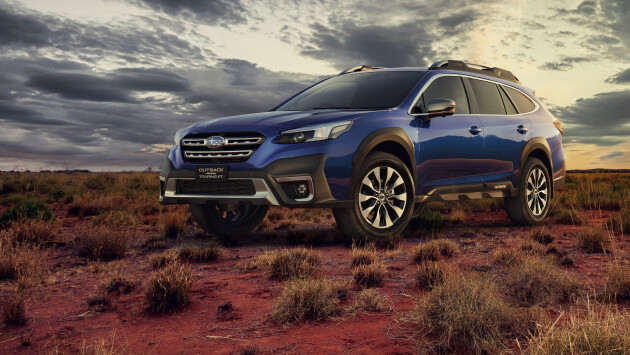 News
News2023 Subaru Outback pricing: XT turbo model arrives
Subie will bring the turbo grade to the local Outback line-up this year
-
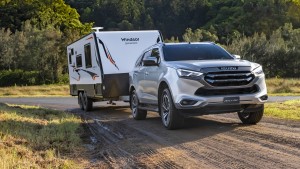 Advice
AdviceTowing: How much can my large SUV tow?
The ability to tow bigger loads is one of the primary ‘reasons for purchase’ of large SUVs, so we’ve compiled a handy guide just how much the most popular mainstream models can haul
-
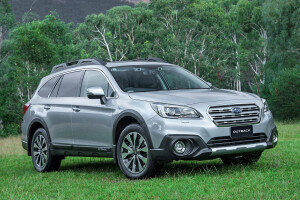 News
NewsSubaru recalls nearly 80,000 vehicles in Australia
The brand has issued a recall for 78,617 examples of the Impreza, XV, Liberty, Outback, WRX and Levorg due to a manufacturing issue
-
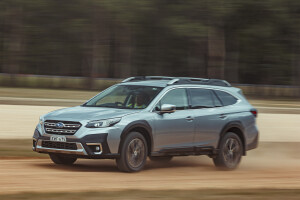 News
News2022 Subaru Impreza, XV and Outback hit with $800 price hike
Increased supply chain costs have forced Subaru to bump up its prices
-
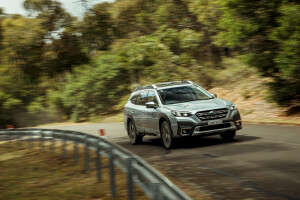
2022 Wheels Car of the Year contender: Subaru Outback
-
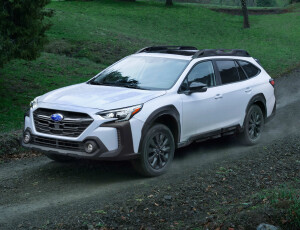
2023 Subaru Outback revealed, Australian debut confirmed
-
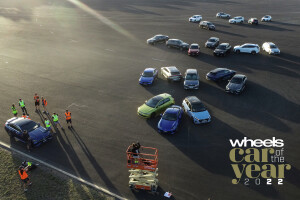
Wheels Car of the Year 2022: The Contenders
-
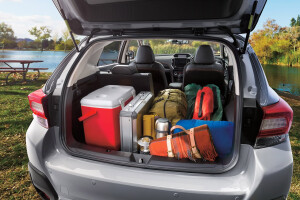
Boot sizes of Australia’s favourite SUVs
Frequently Asked Questions
While the Subaru Outback might not offer the go-anywhere ability of a full-fat 4x4, many owners are surprised at the off-road ability of the model. In addition to its permanent all-wheel drive system, the Outback has 213mm of ground clearance which is above average, while the sophisticated X-Mode traction control system enables the Outback to go further than other less well equipped SUVs and all-wheel drive wagons.
The Subaru Outback range starts at just over $41,000 for the 2.5-litre petrol. At the top of the range the Outback AWD Touring is the most expensive at just under $50,000.
The Subaru Outback has an ingenious roof rack as standard, which allows the mounting bars to be hidden away when not in use and without removing them. Stowed away in the permanently fitted roof rails, the horizontal bars lift and pivot out across the roof and plug securely into the opposite rail. A wide variety of accessories can then be fitted to the bars including a luggage cage or bike rack.



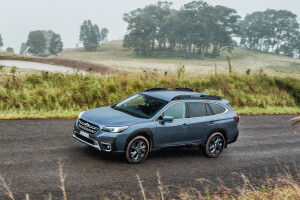
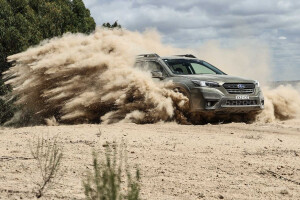
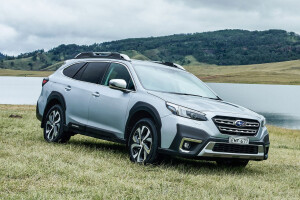
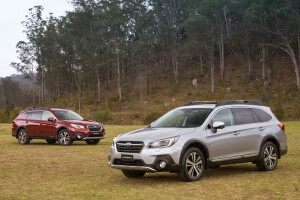
---Copy-(1).jpg)
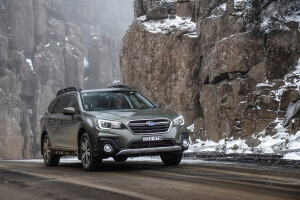
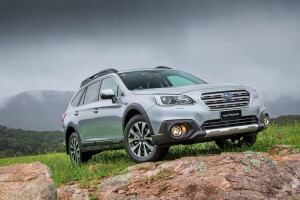
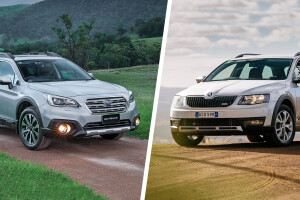

.jpg)